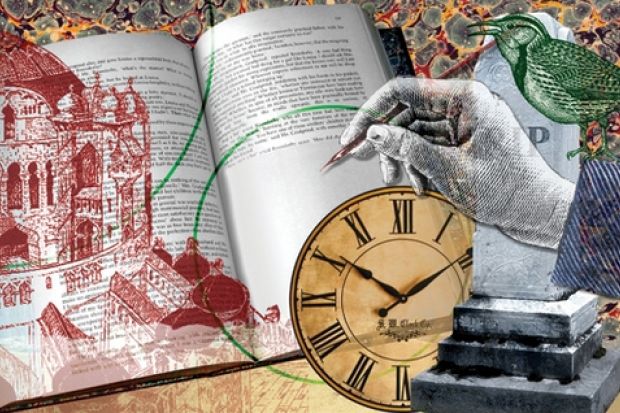The hardest things in art are beginning and ending. Even if you manage to start, there's no guarantee you'll finish. Sometimes you run out of time, inspiration, or even life itself, as happened to Charles Dickens. After spending the afternoon writing the next instalment of his novel The Mystery of Edwin Drood, he came in for dinner and suffered a stroke. He died without regaining consciousness. I have no such excuse for abandoning novels halfway through reading them. Not yet, anyway.
Alastair Sooke began his analysis of the appeal of unfinished works with Dickens' final work, which tells the story of John Jasper, a choirmaster who is in love with his pupil Rosa Bud, who is also Drood's fiancée (Unfinished, BBC Two, Thursday 12 January, 9pm). Alastair was fascinated by the manuscript, which is at the Victoria and Albert Museum. The last page bustled with rewritings and crossings out, but there was no clue to how the novel might end. John Forster, Dickens' friend and first biographer, said that the author had told him that Jasper, who is Drood's uncle, was the killer. Not necessarily, said Gwyneth Hughes, who has just adapted the story for television. The clues point to different people.
"Never trust the teller, trust the tale," as D.H. Lawrence advised. His work was famously open-ended. Rupert Birkin, one of the characters in Women in Love, says that it is much better to leave things sketchy and unfinished because completeness is death. If the programme had been allowed to continue indefinitely, I am sure Lawrence would eventually have been mentioned. As would Samuel Beckett. His play Endgame starts with the word "Finished" and concludes with the word "remain". He is the opposite of Lawrence because he fears that things will never come to end, which, for him, signifies a release from the meaninglessness of existence. He should have taken up a hobby, then he wouldn't have been prey to such thoughts.
Jane Austen died after writing only 11 chapters of her novel Sanditon, a place based on either Eastbourne or Worthing. It is about the creation of a seaside resort and promised to be "long and funny", said Deirdre Le Faye, an Austen scholar. Alastair, who had opted for the Eastbourne location, wanted to read an extract, but said it was too windy. I assume he was referring to the weather and not Ms Austen's style, which is anything but.
What did Deirdre think of people who tried to finish other people's books? She was certain no one could finish Sanditon because no one could imitate Austen's voice. They also tended to be ignorant of the social history of the period, she sniffed. Alastair grabbed a few passers-by, not to stop them from being blown out to sea but to get their thoughts on the matter. An elderly gent was clearly wary about being solicited on the promenade. "You want my what?" he asked. A girl, struggling to keep her hat on, asked: "Why, if they were that brilliant, didn't they write their own thing?" A pensioner couple remarked that "it's lovely in Eastbourne normally". Alastair distributed free copies of Sanditon and headed off to meet Sir Andrew Motion. The former Poet Laureate was wearing a leather biker jacket. I wanted to know why, even if Alastair didn't.
They discussed Coleridge's Kubla Khan, whose "stately pleasure dome" was represented by Kew Gardens. Coleridge had been reading Samuel Purchas' Purchas, His Pilgrimage or Relations of the World and the Religions Observed in All Ages and Places Discovered from the Creation unto the Present and fallen asleep. Well, wouldn't you with a title like that? Anyway, he woke inspired and wrote furiously until he was interrupted by "a person from Porlock" on business; and there you almost have an image of the state of education today. Sir Andrew said the poem's incompleteness was its meaning, for it demonstrates that creative visions can never be realised. It's good to be reminded of such things in our audit-obsessed age. Incompleteness is also a suitable aesthetic for our times. We have lost our certainties and whatever stories we tell about ourselves, whatever truths we discover about the world, we know there's always more to come. All in all, a gem of a programme.
From incomplete to complete works. Dame Diana Rigg pondered the enduring appeal of Ralph Vaughan Williams' The Lark Ascending (The Lark Ascending, BBC Four, Friday 13 January, 7.30pm). After listening to an utterly exquisite performance by the 15-year-old Julia Hwang on the violin and Charles Matthews on piano, she'd worked it out. In a world of discord, war and violence, it gives us, for 14 minutes, "perfect simplicity and harmony". Others may disagree. But there's no end to interpreting works of art, whether they're finished or not.
Register to continue
Why register?
- Registration is free and only takes a moment
- Once registered, you can read 3 articles a month
- Sign up for our newsletter
Subscribe
Or subscribe for unlimited access to:
- Unlimited access to news, views, insights & reviews
- Digital editions
- Digital access to THE’s university and college rankings analysis
Already registered or a current subscriber?
